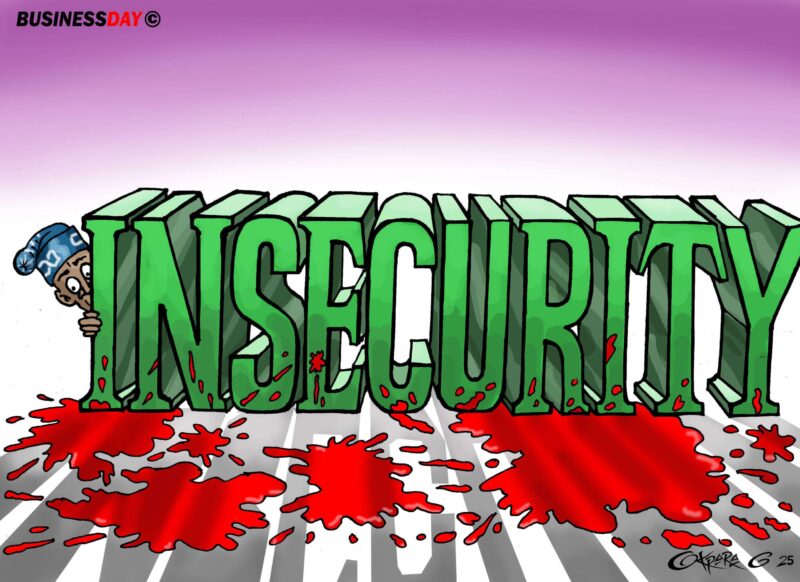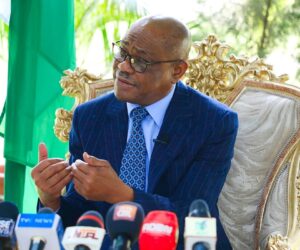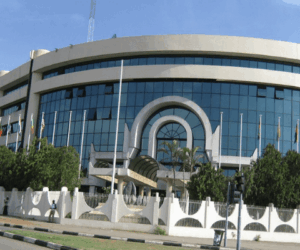…As Northern region continues under attack of criminal elements
…Expert says, ‘Insecurity has become economic activity for a lot of people’
The entire country’s despair and frustration about the persistence of the insecurity bedeviling it now seems to have zeroed in on the question about who is fueling the insecurity and why? Are the Nigerian authorities sincere and decisive about ending insecurity? What benefits are the country and, or, unknown sponsors of the insecurity reaping from it?
The Northern Nigeria seems condemned to perpetual instability and hopelessness, with the seeming intractability of the insecurity ravaging its economy defying all efforts to tackle it.
Just a couple of years after the eruption of Boko Haram insurgency in the North-East in 2009, the twin terrors of banditry and kidnapping boiled up in the North-West, and swept across the North-central in the fashion of the Western bushfires.
Consequently, for sixteen years now, insecurity has troubled the 19-state region, crushing its economy to the most-pathetic state and crumbling all its socio-political and communal structures beyond every hope for restoration in the foreseeable future.
Hundreds of thousands were, and are still being, killed; millions displaced with a large section of these chased out to other states, where they may have built homes and new lives, bidding permanent farewell to their ancestral homes in Borno, Yobe and Adamawa states, where the insurgency erupted.
With fresh terror groups emerging across the region, especially North-West, to compound the region’s pathetic situation, the frightening insecurity has created a huge humanitarian crisis that has continued to attract attention from across the globe.
With this persisting situation, the Nigerian public and every other section of the global community concerned with Nigerian affairs, have continued to ask questions: Can this flame of insecurity torching the major sections of Nigeria ever be doused, and possibly, permanently put off? Who, initially, ignited, and continuously fueling the insecurity? Are the Nigerian authorities sufficiently serious in the fight against the insecurity?
As these questions remain unanswered, and seem unanswerable in the foreseeable future, most-affected states and communities have continued to explore avenues of striking peace deals with the terrorists for the restoration of security and consequent reversion to peaceful and prosperous economic life.
Government has continued to pump trillions of Naira to fund the insecurity war. New state-of-the-art fighter jets, military hardware and ammunition have continued to be purchased; the military command has continued to be rejigged and the terror war strategies have continued to be reviewed and refined.
Yet, the insecurity rages on with seeming intractability, crippling the higher percentage of the Northern and, substantially, the entire country’s economy.
Nigeria’s insecurity has, for whatever reason, become, as musicians would say, “The more you look, the less you see.” The more the country battles, or pretend to battle, the less it succeeds in fixing it.
Religious clerics, especially the renowned Kaduna Islamic cleric, Ahmad Abubakar Mahmud Gumi, carried out extensive interventions between the terrorists in the North-West and the Nigerian authorities with a view to facilitating the restoration of security.
Such peace deals, which have always initially showed heartwarming signs of success, not only crumbled not long after they were struck, but seem to rather compound the calamitous situation.
The entire country’s despair and frustration about the persistence of the insecurity bedeviling it now seem to have zeroed down to: Who is fueling the insecurity and why? Are the Nigerian authorities sincere and decisive about ending insecurity? What benefits are the country and, or, unknown sponsors of the insecurity reaping from it?
Those who advance cross-border views about it attribute its persistence to the proliferation of small arms from the Sahel sequel to similar terror activities there, believing that unless and until Nigeria joins forces with the Sahel countries to tackle the menace, there may not be any end in sight to the insecurity ravaging its major sections.
A growing section of the Nigerian public are of the view that the country’s insecurity seems unending because its ‘untouchable’ sponsors are in the government.
Those who hold these views are bewildered that the country is rich with exceptionally talented security agents that performed excellently during the peace-keeping mission days outside the country but they seem performing sub-optimal in-country.
As the government at all levels continues to promise peace and security, the North East, North West, even North Central continue to record high level of attacks- killings and abductions.
Why way? Many Nigerians ask
Many Nigerians are confused that the level of insecurity is growing in Nigeria despite the technology at the military agencies’ disposal.
Locals seek self-help by negotiating with bandit for survival
While the states and communities continuously clamour to government to save them from the situation, they, on their own partly initiate some efforts towards that.
For instance, in banditry-ravaged Katsina, community leaders in Kurfi Local Government Area of Katsina State have signed a peace agreement with bandit leaders who have been terrorising the area.
The deal is aimed at putting an end to years of killings, kidnappings, and cattle rustling.
The peace meeting was held recently inside Wurma Forest, one of the most notorious hotspots for insecurity.
It was led by the Maradin Katsina and District Head of Kurfi, Mansur Amadu Kurfi, along with the council Chairman, Babangida Abdullahi Kurfi.
Speaking on the meeting, the District Head Amadu Kurfi said it marked a new chapter for the people.
“This is a step for the progress of our community. We have chosen peace, and we will protect this trust for the sake of our people,” he said.
He also advised the bandit leaders to select traditional heads among themselves to ensure accountability.
Bandit commanders including Usman Kachalla Ruga, Sani Muhindinge, Yahaya Sani (popularly known as Hayyu), and Alhaji Shu’aibu all pledged to abandon violence. They promised to stop killing, kidnapping, and cattle rustling, and assured that farmers could now go back to their farms without fear.
“From today, we drop our weapons of violence. We want peace, and we will release the people in our custody,” they declared.
Council Chairman, Abdullahi praised the accord, describing it as the beginning of lasting peace in Kurfi.
“This is the end of insecurity in our communities. We will fulfill our promises, from rehabilitating schools and hospitals to ensuring your detained members are fairly treated,” he said.
In a significant move towards restoring peace to Kaduna State, scores of bandits terrorising not less than five local government areas have agreed to drop their arms and discontinue their reign of terror in and around the state.
The bandits are known to terrorise Chikun, Kajuru, Kagarko, Giwa and Birnin Gwari local government areas.
Based in enclaves, they have terrorised communities and major highways, such as the Kaduna-Abuja highway, Kaduna-Birnin Gwari highway, as well as the Funtua-Birnin Gwari road.
By the same token, a peace deal was reportedly called in Kaduna by the Kaduna State Government, in collaboration with some federal government agencies that saw many notorious bandit kingpins and their foot soldiers pledging peace and agreeing to lay down their arms.
Within a stretch of three days in December, our correspondent accompanied government officials to various enclaves and observed the interactions between the bandits, mostly armed with AK47 rifles, and representatives of the government in Tsohuwar Gayan, Chikun local government area; Rima Forest and Maidaro in Giwa Local Government Area; as well as Kamfanin Doka, along the Funtua-Birnin Gwari road.
Zamfara, the epicenter of banditry, communities negotiate with bandits amid government inaction
In a stark reflection of the deteriorating security situation in Nigeria’s northwest, communities in Bagega and Kawaye districts in Anka Local Government Area of Zamfara State have taken the extraordinary step of negotiating directly with bandits to secure a semblance of peace, especially as the rains set in and the farming season approaches.
This move underscores the desperation of communities left vulnerable by the absence of effective government intervention.
The governor has accused the federal security agencies of not doing their work. There have been responses from the the opposition in the state and elsewhere saying that the governor was politicizing the situation in Zamfara.
For nearly three weeks leading up to May 8, 2025, some communities in the state were under siege. Bandits imposed a blockade, preventing movement in and out of Bagega, shutting down its market, and bringing economic activity to a standstill.
The siege resulted in the kidnapping of dozens and the deaths of at least 13 people. A military convoy operated only once weekly – without it, people risked being killed by bandits lying in wait.
Securing porous borders will stabilise regional security – Laka
Recently, at a two-day conference on ‘Combating Emerging Terrorist Groups and Strengthening Sustainable Security in the ECOWAS and Sahel Region,’ Maj-Gen. Adamu Laka, co-ordinator, National Counter Terrorism Centre (CTC), said that fighting terrorism requires robust non-kinetic measures that foster dialogue, reconciliation, education, economic empowerment, social cohesion, and community resilience.
Laka said that Nigeria has been focusing on initiatives such as community engagement, counter-radicalisation and deradicalisation programmes, strategic communication to counter extremist propaganda, as well as rehabilitation and reintegration of disengaged individuals, including psychosocial support for victims.
According to him, sustainable security is not about military actions but about winning hearts and minds, restoring trust in governance, and investing in human development and the rule of law in our counterterrorism efforts.
“Renewed commitment to operationalise the ECOWAS Counterterrorism Force and ensure it is adequately resourced. A clear roadmap for enhancing intelligence sharing and securing our porous borders. Practical strategies for mainstreaming youth, civil society, and media actors into the regional security architecture.”
LG must be closer to grassroots to curb recruitment into terrorism – Expert
Senator Iroegbu, a security expert, said the situation was gradually overwhelming the military struggle against terrorism and violent extremism across the region, as terrorists and insurgent groups continued to exploit porous borders, ungoverned spaces, and instill fears into the minds of civilians to propagate their agenda.
He further said that there was the need for military to analyse, restrategise, and understand the dynamism of conflict which would help them to devise means of solving it.
Iroegu said: “So, sometimes, we treat symptoms rather than the causes. For instance, paying ransom is a kind of encouraging the bandits. Now on the part of the citizen, which is another indicator; if the citizens are increasingly negotiating with bandits themselves, it means that they no longer want to wait for the government. They are left to defend themselves. And when you also hear the utterances of some government officials like the Chief of Defense Staff and the Director General of DSS once said, ‘Look, citizens should be able to take up arms and, defend themselves. They should not be waiting.’
“I think it’s an indication to citizens that they feel that they have to find a way to procure their own safety. But how sustainable? How long are they going to be paying ransom? That’s the question, because if you have money to pay today, will you have to pay tomorrow?”
According to him, “So, apart from having an intelligence-led operation, just like as is reported few weeks back, about the arrest of terrorist kingpins, it was an intelligence-led operation. So, if you increase intelligence-led operations, then improve local governance system in Nigeria, because once government is closer to the people, and there is development, people are engaged, you have less recruits to be engaged in banditry, because this has become an economic activity for a lot of people.
“Intensifying military operation, intensifying intelligence-led oppression, and improving governance system will help so much. The porous border is also an issue, because sometimes, these people crisscross from the Sahel region down to all these ungoverned spaces.
“So, because right now, there is a diplomatic row between Nigeria and some of these countries where this insecurity is coming from, the Sahel region, which counter terrorism, in this report, said that that’s the epicenter of terrorism globally now that is Sahel region.
“So, we are having these three countries now that form alliance of the Sahel state and pull out from the ECOWAS, even though at diplomatic level we may not, we should improve our security and intelligence cooperation, and improve our border security.”








